Related Research Articles

Queen II is the second studio album by the British rock band Queen. It was released on 8 March 1974 by EMI Records in the UK and Elektra Records in the US. It was recorded at Trident Studios and Langham 1 Studios, London, in August 1973 with co-producers Roy Thomas Baker and Robin Geoffrey Cable, and engineered by Mike Stone. It is significant for being the first album to contain elements of the band's signature sound of multi-layered overdubs, vocal harmonies, and varied musical styles.

Sheer Heart Attack is the third studio album by the British rock band Queen, released on 8 November 1974 by EMI Records in the United Kingdom and by Elektra Records in the United States. Digressing from the progressive themes featured on their first two albums, the album featured more pop-centric and conventional rock tracks and marked a step towards the "classic" Queen sound. It was produced by the band and Roy Thomas Baker, and launched Queen to mainstream popularity in the UK and throughout the world.

Queen is the debut studio album by the British rock band Queen. Released on 13 July 1973 by EMI Records in the UK and by Elektra Records in the US, it was recorded at Trident Studios and De Lane Lea Music Centre, London, with production by Roy Thomas Baker, John Anthony and the band members themselves.
"Killer Queen" is a song by the British rock band Queen. It was written by lead singer Freddie Mercury and recorded for their third album Sheer Heart Attack in 1974. It reached number two in the UK Singles Chart and became their first US hit, reaching number twelve on the Billboard Hot 100. The song is about a high-class call girl and has been characterised as "Mercury's piano-led paean to a Moët-quaffing courtesan".
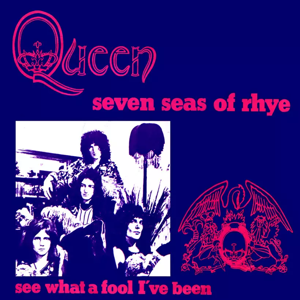
"Seven Seas of Rhye" is a song by the British rock band Queen. It was primarily written by Freddie Mercury, with Brian May contributing the second middle-eight. The song is officially credited to Mercury only. A rudimentary instrumental version appears as the final track on the group's self-titled debut album (1973), with the final version on the follow-up Queen II (1974).

Game Theory was an American power pop band, founded in 1982 by singer/songwriter Scott Miller, combining melodic jangle pop with dense experimental production and hyperliterate lyrics. MTV described their sound as "still visceral and vital" in 2013, with records "full of sweetly psychedelic-tinged, appealingly idiosyncratic gems" that continued "influencing a new generation of indie artists." Between 1982 and 1990, Game Theory released five studio albums and two EPs, which had long been out of print until 2014, when Omnivore Recordings began a series of remastered reissues of the entire Game Theory catalog. Miller's posthumously completed Game Theory album, Supercalifragile, was released in August 2017 in a limited first pressing.
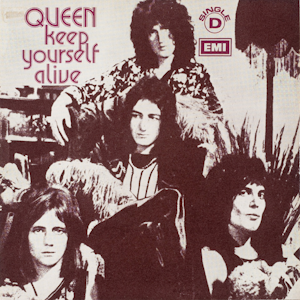
"Keep Yourself Alive" is the debut single by the British rock band Queen. Written by guitarist Brian May, it is the opening track on the band's self-titled debut album (1973). It was released as Queen's first single along with "Son and Daughter" as the B-side.

"Who Wants to Live Forever" is a song by the British rock band Queen. A power ballad, it is the sixth track on the album A Kind of Magic, which was released in June 1986, and was written by lead guitarist Brian May for the soundtrack to the film Highlander. Queen was backed up by an orchestra, with orchestrations by film score composer Michael Kamen. The song peaked at No. 24 in the UK charts. In 1991, it was included in the band's second compilation album Greatest Hits II.

"Long Away" is a song by the British rock band Queen; it is the third track on their 1976 album A Day at the Races. Brian May wrote the song and sings the lead vocals. It is the only Queen single released during Freddie Mercury's lifetime not to be sung by him, and was released as the third single from the album in North America and New Zealand only.

"Las Palabras de Amor (The Words of Love)" is a rock ballad by the British rock band Queen. It was released as the third single from their 1982 album Hot Space. It is sung mostly in English, but with several Spanish phrases. Written by guitarist Brian May, the song proved more popular in the United Kingdom than their previous single ("Body Language"), reaching No. 17 in the UK Singles Chart.

"Friends Will Be Friends" is a song performed by Queen, written by Freddie Mercury and John Deacon, released on 9 June 1986 as a single for the album A Kind of Magic. It was the band's 30th single in the UK upon its release, reaching number 14 in the UK.

"Flick of the Wrist" is a song by the British rock band Queen, released as a double A-side with "Killer Queen" in the United Kingdom, Canada, the Netherlands, the United States and most other territories. It was written by Freddie Mercury for the 1974 album Sheer Heart Attack.
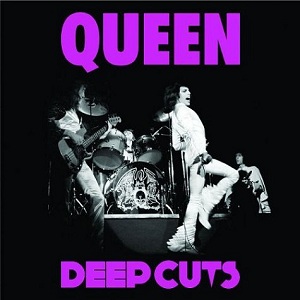
Deep Cuts, Volume 1 (1973–1976) is a compilation of Queen tracks between 1973 and 1976. Unlike other compilations released by Queen, Deep Cuts contains songs which are largely not as well known as Queen's hits. The album was released on 14 March 2011 as part of Queen's 40th anniversary. Deep Cuts Volume 1 was released at the same time Queen's first five albums were re-released. The songs picked were all personal favourite songs, that were not hits, selected by Brian May, Roger Taylor, and Taylor Hawkins. It is the only release to feature the complete ending of "The March of The Black Queen" and of "Ogre Battle". The three songs "Tenement Funster", "Flick of the Wrist" and "Lily of the Valley" all segue into each other just as on the original Sheer Heart Attack album.
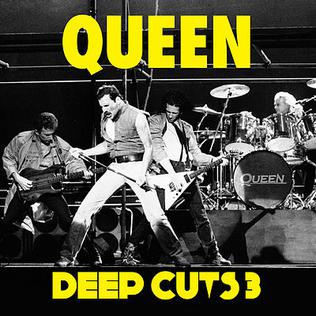
Deep Cuts, Volume 3 (1984–1995) is a compilation of Queen featuring some of their lesser-known tracks from between 1984 and 1995. Deep Cuts Volume 3 was released on 5 September 2011, as part of Queen's 40th Anniversary, simultaneously with the third group of five reissues of Queen studio albums from which the songs are sampled. In this release, "Khashoggi's Ship" has a drum intro and "It's a Beautiful Day (Reprise)" starts with 15 seconds of slow build-up and ends with "Yeah". The release date of the album would have also been former lead singer Freddie Mercury's 65th birthday.

"Love Kills" is a song by Freddie Mercury, and his first song released as a solo artist, though the other members of Queen appeared on the song - initially uncredited.

Hungarian Rhapsody: Queen Live in Budapest is a concert film of the British rock band Queen's performance at the Népstadion in Budapest on 27 July 1986. It was part of the band's final tour with original lead singer Freddie Mercury, The Magic Tour. Queen were one of the few bands from Western Europe to perform in the Eastern Bloc during the Cold War. The film had a limited theatrical release in Eastern Bloc countries in 1987/1988 and worldwide on 20 September 2012. The concert was released on VHS and Laserdisc in the UK and Japan on 16 February 1987 under the original title Queen Live In Budapest, and on DVD and Blu-ray for the first time on 5 November 2012 worldwide, except in the United States where it was released a day later. The concert title is a play on the Hungarian Rhapsodies by Franz Liszt and one of Queen's most celebrated hits, "Bohemian Rhapsody".
"There Must Be More to Life Than This" is the eighth track on Queen singer Freddie Mercury's debut solo album Mr. Bad Guy, released on 29 April 1985 by Columbia Records.
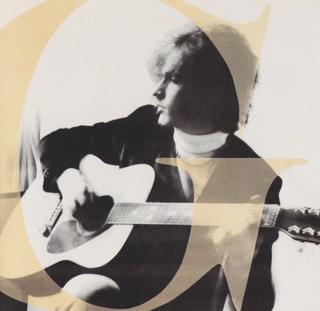
Real Nighttime is the second full-length album from Game Theory, a California power pop band founded by guitarist and singer-songwriter Scott Miller. Released in 1985, the album is cited as "a watershed work in '80s paisley underground pop." A 30th anniversary reissue was released in March 2015, on CD and in a limited first pressing on red vinyl, with 13 bonus tracks.
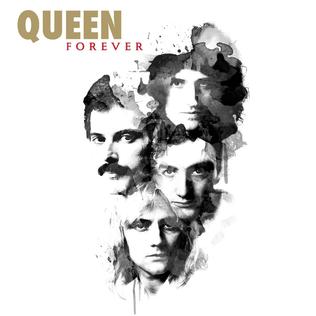
Queen Forever is a compilation album by the British rock band Queen. Released on 10 November 2014, it features tracks the band had "forgotten about" with vocals from original lead singer Freddie Mercury. Queen's bassist John Deacon is also on the tracks.

A Night at the Odeon is a live album by the British rock band Queen. The album is the first official release of the band's Christmas Eve performance at the Hammersmith Odeon in 1975, filmed by the BBC. The show was broadcast on BBC2 and BBC Radio 1, and included one of the first live performances of "Bohemian Rhapsody". It is the band's most popular bootleg.
References
- ↑ Purvis, Georg (2012). Queen: The Complete Works. Titan Books. p. 677. ISBN 9781781162873.
- ↑ Thomas, David (August 1999). "Their Britannic Majesties Request". MOJO (69). Archived from the original on 14 December 2019. Retrieved 8 September 2016– via brianmay
.com . {{cite journal}}: External link in|via= - ↑ Omnivore Recordings (26 January 2015). "Game Theory Real Nighttime". Press Release. Archived from the original on 26 January 2015. Retrieved 26 January 2015.
- ↑ Black Clouds & Silver Linings (Special Edition) Allmusic. Retrieved 1 September 2011
- ↑ "Deep Cuts Volume 1 (1973-1976) (Remastered Edition)". Queen. Retrieved 9 November 2020.
- ↑ "Queen - Deep Cuts Volume 1 (1973-1976)". Discogs . Retrieved 9 November 2020.
- ↑ "Queen - Queen Forever". Discogs. 7 November 2014. Retrieved 22 November 2020.
- ↑ Giles, Jeff (19 September 2014). "Queen Unearth Previously Unreleased Tracks for New 'Queen Forever' Compilation". Ultimate Classic Rock. Retrieved 22 November 2020.
- ↑ "Queen announce Queen Forever album PLUS unreleased Freddie Mercury songs!". www.officialcharts.com. Retrieved 22 November 2020.
- ↑ "Queen "Forever" album and song lyrics". www.ultimatequeen.co.uk. Retrieved 22 November 2020.